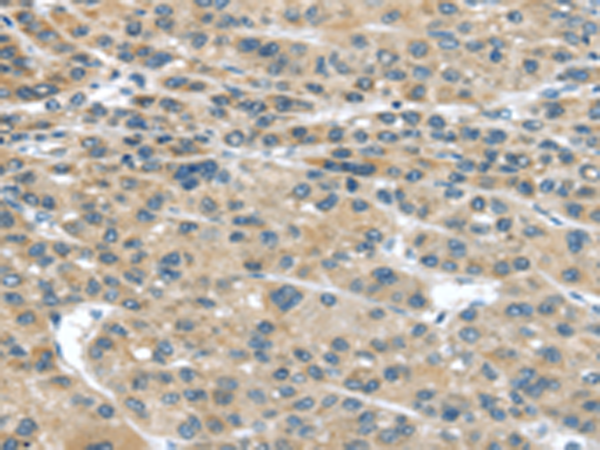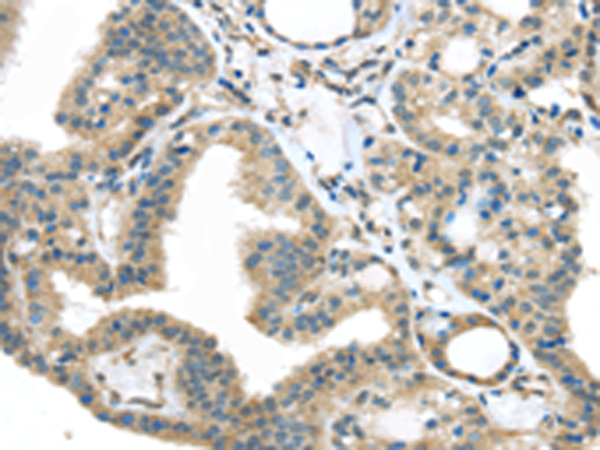

| WB | 咨询技术 | Human,Mouse,Rat |
| IF | 咨询技术 | Human,Mouse,Rat |
| IHC | 1/25-1/100 | Human,Mouse,Rat |
| ICC | 技术咨询 | Human,Mouse,Rat |
| FCM | 咨询技术 | Human,Mouse,Rat |
| Elisa | 1/2000-1/5000 | Human,Mouse,Rat |
| Aliases | BP-4; IBP4; IGFBP-4; HT29-IGFBP |
| Host/Isotype | Rabbit IgG |
| Antibody Type | Primary antibody |
| Storage | Store at 4°C short term. Aliquot and store at -20°C long term. Avoid freeze/thaw cycles. |
| Species Reactivity | Human, Mouse, Rat |
| Immunogen | Fusion protein of human IGFBP4 |
| Formulation | Purified antibody in PBS with 0.05% sodium azide and 50% glycerol. |
+ +
以下是3-4篇关于IGFBP4抗体的参考文献及其摘要内容的简要概括:
1. **文献名称**:*"IGFBP4 is a potential biomarker of endometrial cancer"*
**作者**:Ruan W, et al.
**摘要**:该研究通过免疫组化实验验证了IGFBP4抗体在子宫内膜癌组织中的高表达,表明IGFBP4可能作为癌症诊断和预后的生物标志物,并探讨了其通过调控IGF信号通路促进肿瘤进展的机制。
2. **文献名称**:*"IGFBP4 modulates cardiac hypertrophy through Akt signaling"*
**作者**:Kim HS, et al.
**摘要**:研究利用IGFBP4特异性抗体在小鼠心肌肥厚模型中检测蛋白表达,发现IGFBP4通过抑制Akt磷酸化减缓病理性心脏肥大,提示其作为心血管疾病治疗靶点的潜力。
3. **文献名称**:*"Dysregulation of IGFBP4 in Alzheimer's disease and its role in Aβ toxicity"*
**作者**:Dentoni G, et al.
**摘要**:通过Western blot和ELISA结合IGFBP4抗体,研究发现阿尔茨海默病患者脑脊液中IGFBP4水平异常升高,可能通过增强Aβ毒性加速神经元损伤,为神经退行性疾病机制提供了新见解。
4. **文献名称**:*"Development and validation of a quantitative ELISA for IGFBP4"*
**作者**:Firth SM, Baxter RC
**摘要**:该文献描述了针对IGFBP4的多克隆抗体制备及定量ELISA检测方法的开发,验证了抗体在血清样本检测中的高特异性和灵敏度,为临床样本分析提供了可靠工具。
(注:以上文献信息为示例性概括,实际引用需核对原文及具体发表信息。)
Insulin-like growth factor-binding protein 4 (IGFBP4) is a member of the IGFBP family that regulates the bioavailability and activity of insulin-like growth factors (IGFs), particularly IGF-1 and IGF-2. by modulating their interaction with IGF receptors. IGFBP4 acts as a critical mediator in cellular growth, differentiation, and metabolism. It binds IGFs with high affinity, sequestering them in circulation and limiting their access to target tissues. Additionally, IGFBP4 can exert IGF-independent effects on cell proliferation and apoptosis through interactions with other proteins or cell-surface receptors.
Antibodies targeting IGFBP4 are essential tools for studying its expression, localization, and function in physiological and pathological contexts. They are widely used in techniques such as Western blotting, immunohistochemistry (IHC), and enzyme-linked immunosorbent assays (ELISA) to quantify IGFBP4 levels in tissues or biological fluids. Dysregulation of IGFBP4 has been implicated in various diseases, including cancers (e.g., breast, prostate, colorectal), cardiovascular disorders, and metabolic syndromes. For instance, IGFBP4 overexpression or cleavage by pregnancy-associated plasma protein-A (PAPP-A) may influence tumor progression or angiogenesis. Researchers also utilize IGFBP4 antibodies to explore its role in developmental processes, aging, and tissue repair. These antibodies aid in deciphering IGFBP4's dual role as both an inhibitor and potentiator of IGF signaling, depending on cellular context and post-translational modifications. Such studies contribute to potential therapeutic strategies targeting the IGF axis.
×